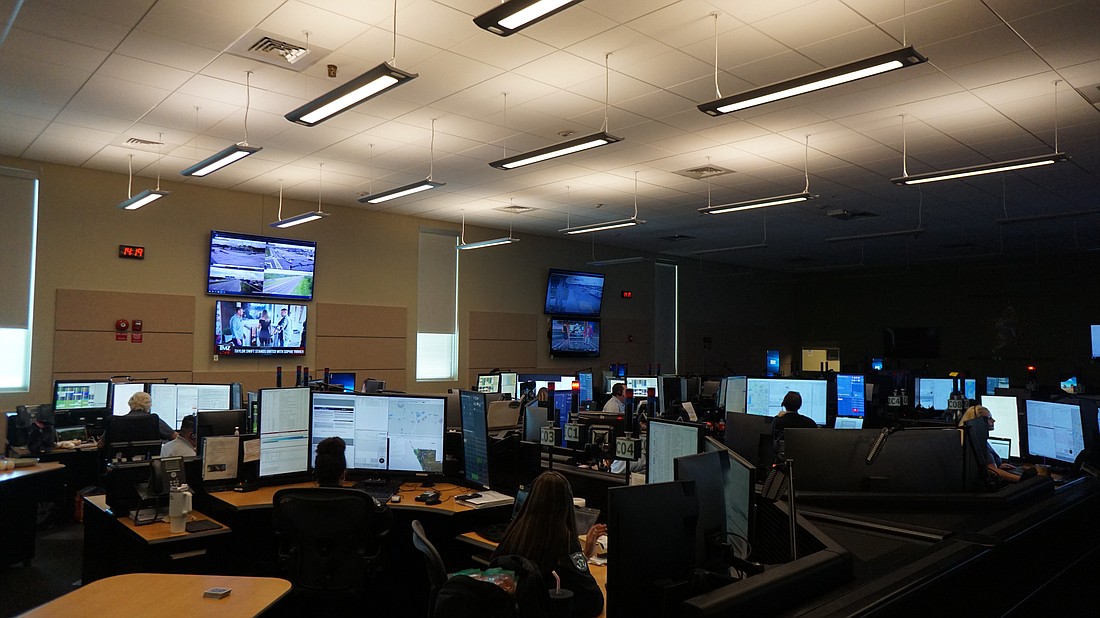- November 5, 2025
-
-
Loading

For the foreseeable future, emergency and nonemergency dispatch services will remain with Sarasota County rather than return to Longboat Key.
At the Jan. 22 Town Commission workshop, representatives from the Sarasota County Sheriff’s Office Emergency Operations Center spoke with commissioners about the dispatch service following concerns raised about its efficacy.
In September 2023, several residents showed up to a Town Commission meeting to express their issues with the nonemergency dispatch service, which operates out of the Sarasota County Sheriff’s Office Emergency Operations Center.
One of the stories, shared by former Commissioner Lynn Larson, was a time when she called the nonemergency number to request help with a floating dock that was endangering her property.
The call-taker told Larson she was in Charlotte County and that she should hang up and call Charlotte County, according to Larson’s account.
At the time, commissioners shared some frustrations, but town officials said the switch to a dispatch service on Longboat Key would be a heavy lift.
“One of the things that we know, without spending a considerable amount of money, is that the board about 10 years ago made an irreversible decision,” Town Manager Howard Tipton said at the recent workshop.
At the Jan. 22 workshop, he briefed commissioners on a survey conducted by town and county staff for the nonemergency line.
The survey was conducted during a 45-day period between Oct. 15 and Nov. 13, 2023. In that time, there were 65 calls to the nonemergency line from Longboat Key, five of which were elevated to an emergency call.
Tipton said it proved a low call volume, and the next steps were to connect with the county’s emergency operations center and see what can be done about improving the service.
“With this relationship cemented, in my opinion, the question becomes how do we get it better,” Tipton said.
He acknowledged that commissioners have had personal issues with the service in the past and summarized that call-taker’s lack of familiarity with Longboat Key and the length of time of the calls were among the top complaints.
Captain Dan Tutko with the Sarasota County Sheriff’s Office Emergency Operations Bureau presented an overview of the dispatch service to commissioners at the workshop.
In the center which he oversees, there are 94 call-taker positions. Of those, 25 are vacant, meaning about 30% of the workforce is missing, he said. That’s filled with overtime.
Training for new recruits is extensive, Tutko said. It starts with a 240-hour, or 7-week, academy, followed by 57 days of on-the-job training. That being said, it takes about nine months of training until someone can work as a call-taker completely alone.
“Now, sometimes things don't go as planned. Sometimes people don't listen to the caller,” Tutko said, referring to Larson’s experience. He said the fault lay with the call-taker in that situation.
All of that was to say the center is short-staffed and, while the training is extensive, turnover rates may contribute to the lack of familiarity.
An increase in call volume, on top of being short-staffed, can sometimes lead to imperfections, Tutko said.
“Not everything's perfect. And I want it to be as perfect as possible, because we're dealing with life and death situations,” Tutko said.
In 2023, the total call volume, calls in and out of the center, was 706,769 calls. That’s an 8% increase from 2022, which had 657,936 calls.
Of the 2023 calls, 298,717 were emergency calls.
Tutko estimated that of all the calls in 2023, about 15,000 were for Longboat Key law enforcement and 2,000 were for Longboat Key Fire Rescue.
Another concern raised by commissioners and residents was that when someone calls the nonemergency line there is an automated list of transfer options before getting to an operator.
Tutko said the department switched to this system last June, and it has diverted about 1,600 calls per month using the automated system. The more calls that can be diverted to other departments, the more time call-takers can spend on the line.
In explaining the call-taking system, Tutko mentioned that nonemergency calls do not come in with location information like emergency calls do.
Vice Mayor Mike Haycock and District 2 Commissioner Penny Gold both asked if the location identification technology could be applied to nonemergency calls in an effort to decrease the confusion and delay in address verification.
But Tutko said he didn’t believe that would be as easy as some may think.
In the end, though, both Tipton and Tutko emphasized this is a partnership.
“They’re tasked with doing their job,” Tipton said. “And then form a resident responsibility, what are the things that we need to help our residents have a better handle.”
To help, Tipton said residents could become aware of the nearest cross street to their home and keep it noted. He said it’s also a matter of realizing everyone is doing their best.
Tutko said residents should have confidence in the system, and that the center will continue to work together to make this a more efficient process.
“I think everybody needs to have confidence in what we do,” Tutko said. “And I don't know if you want to put yourself in that position to find out if you can do better, because what can happen is you can fail miserably.”